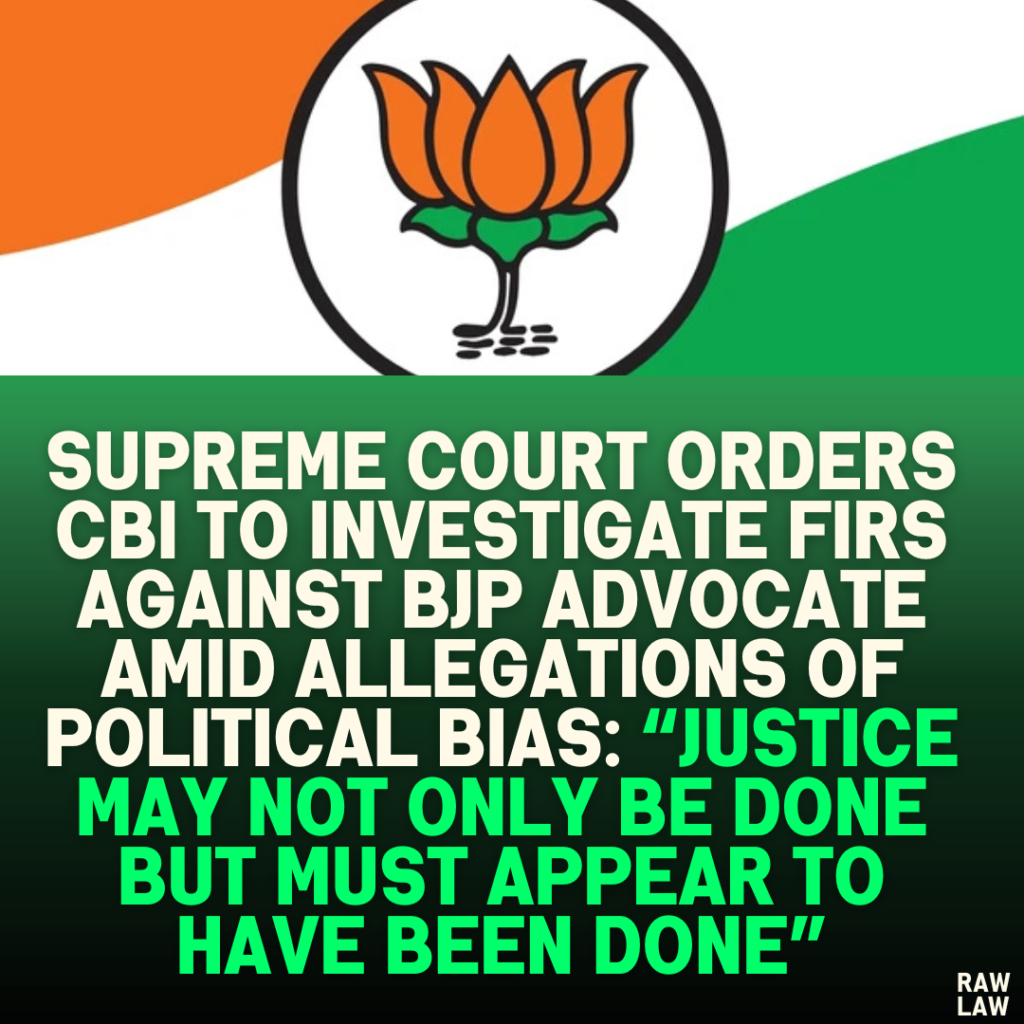Court’s Decision
The Supreme Court of India transferred the investigation of two FIRs filed against the petitioner from the West Bengal Police to the Central Bureau of Investigation (CBI). The Court concluded that the local police, influenced by the political climate, may not conduct a fair investigation. It emphasized the need for impartiality and credibility, stating: “Justice may not only be done but must appear to have been done.”
The Court issued a writ of mandamus directing the State of West Bengal to hand over all investigation records to the CBI for completion of the probe, ensuring fairness and transparency.
Facts of the Case
- Petitioner’s Background:
The petitioner is a practicing advocate and active member of the BJP, the opposition party in West Bengal. He was previously married to the daughter of a sitting MP from the ruling party, TMC. Their marriage ended in divorce in 2018, leading to personal and political hostility. - Incident:
On December 6, 2020, the petitioner’s residence was surrounded by a mob allegedly led by TMC supporters. While his CISF guards saved his life, some were injured during the melee. The petitioner was later arrested under two FIRs filed by local complainants. - FIR Details:
- FIR No. 400/2020 included allegations under IPC Sections 341, 323, 325, 326, 307, 354, 504, 506, and 34.
- FIR No. 401/2020 included allegations under IPC Sections 341, 325, 354A, and 34.
- Petitioner’s Allegations:
- The petitioner alleged that the FIRs were politically motivated, lodged at the behest of his ex-father-in-law and the ruling party.
- He claimed the local police were biased and complicit in targeting him, violating his fundamental right to a fair investigation.
- Interim Stay:
On January 13, 2021, the Supreme Court stayed the proceedings under the FIRs, halting further investigation by the local police.
Issues for Consideration
- Should the investigation of the FIRs be transferred to an independent agency like the CBI?
- Can the local police be trusted to conduct a fair and impartial investigation given the political affiliations and personal hostilities involved?
Petitioner’s Arguments
- Bias in Local Investigation:
The petitioner argued that the politically charged atmosphere in West Bengal and the involvement of his ex-father-in-law, a ruling party MP, made it impossible to receive an unbiased investigation by the local police. - Misuse of State Machinery:
He alleged that state agencies acted as a “private army” under the ruling party’s influence, victimizing him for his political affiliations. - Threats and Harassment:
The petitioner highlighted threats from his political adversaries and claimed that the local police, instead of providing protection, acted under political pressure to implicate him. - Right to Fair Investigation:
The petitioner contended that his fundamental rights under the Constitution were being violated and sought the intervention of the Supreme Court to transfer the investigation to the CBI.
Respondent’s Arguments
- State of West Bengal:
- Denied allegations of bias, stating that the FIRs involved cognizable offences, including grievous hurt and outraging the modesty of a woman, which required thorough investigation.
- Asserted that the petitioner was evading the investigation and had fabricated a political narrative to shield himself.
- MP’s Arguments:
- The MP (petitioner’s ex-father-in-law) denied the petitioner’s claims, arguing that the allegations were baseless and politically motivated.
- Claimed that the petitioner was attempting to malign his reputation out of personal grudge stemming from their past familial discord.
Analysis of the Law
The Supreme Court discussed the principles governing the transfer of investigations to independent agencies, emphasizing that:
- Fairness and Credibility:
Investigations must not only be impartial but also appear credible to the public, especially in politically sensitive cases. - Extraordinary Circumstances:
The Court observed that the power to transfer investigations is not to be exercised routinely but reserved for exceptional situations where fairness and justice are at risk. - Precedents Cited:
- State of West Bengal vs. Committee for Protection of Democratic Rights (2010): Established that courts could intervene to transfer investigations to uphold justice.
- Rubabbuddin Sheikh vs. State of Gujarat (2010): Highlighted the Court’s duty to order independent investigations in cases involving high-profile accusations.
- K.V. Rajendran vs. CBCID (2013): Affirmed the Court’s power to transfer cases when the accused are high-ranking officials capable of influencing local investigations.
Precedent Analysis
The Court relied on precedents to establish that:
- Transfer of investigations to independent agencies is warranted when the credibility of the investigation is at stake.
- Constitutional courts must exercise their discretionary power judiciously, ensuring fairness and justice.
Court’s Reasoning
- Politically Charged Atmosphere:
The Court recognized that the petitioner’s affiliations with the opposition party and the alleged involvement of the ruling party MP created a hostile environment, raising legitimate concerns of bias. - Conflicting Interests:
The involvement of CISF personnel in the incident added another layer of complexity, making it inappropriate for the local police to investigate impartially. - Impartiality of CBI:
The Court emphasized that transferring the investigation to the CBI would not prejudice any party but instead ensure a fair and credible inquiry.
Conclusion
The Supreme Court ordered the transfer of the investigation to the CBI, directing the State to hand over all relevant records. The Court noted that an independent agency would ensure an impartial probe, free from political interference, and concluded: “The politically charged atmosphere in West Bengal may not be conducive to a fair investigation by the local police.”
Implications
This judgment reinforces the judiciary’s role as a guardian of fundamental rights, particularly in politically sensitive cases. By ensuring a credible investigation, the decision affirms public confidence in the legal system and underscores the importance of fairness in the administration of justice.



